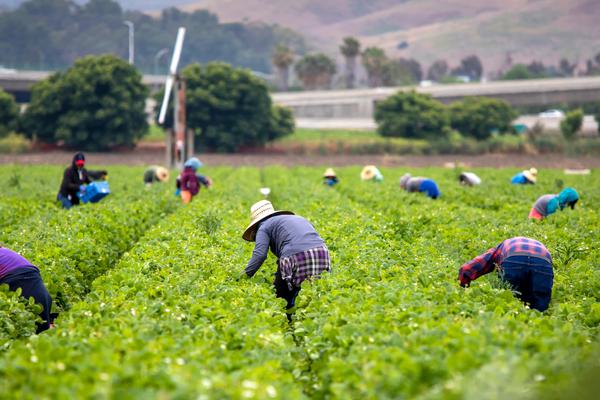Sorry… I Dozed Off Reading Your Modern Slavery Statement
15 October 2020

International Anti-Slavery Day on 18 October is a good chance to reflect on that most totemic part of the UK’s, and now Australia’s, modern slavery legislation – the corporate modern slavery statement.
It is nearly 5 years now since the introduction of the UK Modern Slavery Act. Defined by the ILO as “work or service which is exacted from any person under the threat of a penalty and for which the person has not offered himself or herself voluntarily”, the Act sought to consolidate existing legislation around modern slavery and support efforts by companies to prevent modern slavery in their supply chains both at home and abroad.
A key component of the Act – one that has received considerable attention and criticism requires for all companies with a turnover above £36 million to produce an annual modern slavery statement. Its purpose is to set out, with executive level sign off – the steps a company is taking to prevent slavery occurring in their immediate operations and extended supply chains. These should include:
- Organisation structure and supply chains
- Policies in relation to slavery and human trafficking
- Due diligence processes
- Risk assessment and management
- Key performance indicators to measure effectiveness of steps being taken
- Training on modern slavery and trafficking
Despite being a legal requirement, experience to date shows there has been a very patchy response to this transparency requirement. Many companies required under the Act to produce a statement have chosen not to do so.
It is noticeable how few companies, even those who are undertaking thoughtful and admirable work around this agenda, are producing statements that are genuinely insightful.
Companies that have produced statements often fail to respond to specific requirements of the Act, including those produced by companies contracting with the UK Government. It is also the case that many statements are not easily accessible from company websites.
There are currently no criminal sanctions for failure to produce a modern slavery statement, although the Government could seek a court order. After criticism from many quarters, last year the UK Home Office sent letters to non –compliant companies threatening to name and shame them. However, to date, no company has been sanctioned for failing to produce a modern slavery statement.
Even when companies have been compliant, one thing that always stands out when reading the statements: how dull most of them are!
Bare-bones, templates, and legalese
These listless statements come in several guises.
At the bottom end, like truculent schoolboys handing in overdue homework, some companies deliberately go for the bare minimum – the simplest one-page statement that says the company is opposed to modern slavery in all its forms, and that’s about it.
The slightly more daring companies stress a zero-tolerance approach, but nothing about what the company is actually doing to address labour rights abuses.
Other companies rely on external consultants, who often use an easily reproduced template to meet the requirements. These identikit statements allow key information to be neatly dropped into place, ready for a quick sign off by the CEO at the end.
Crafting a story on efforts to prevent modern slavery could be equally compelling.
Others are put together by in-house legal teams – every word carefully chosen to ensure that it doesn't compromise the company; full marks for compliance, but insufferably bland with little insight into the challenges that all companies, including responsible and law-abiding ones, face in tackling this issue.
It is noticeable how few companies, even those who are undertaking thoughtful and admirable work around this agenda, are producing statements that are genuinely insightful. And if you can’t make your modern slavery statement interesting, setting out a clear understanding of where the risks lie and describing thoughtful, properly resourced programmes to address those challenges, what does that tell us about your attitude to tackling modern slavery?
It doesn't have to be this way.
Inspire, Don’t Sedate
If written with the care and thought that goes into other forms of company communications, modern slavery statements could be seen as an extension of the company’s brand. A brand is a collection of elements, ideas, and assumptions, carefully crafted and curated by the company, telling its unique story, added value, and impact, with marketing budgets allocated accordingly. A company’s efforts to prevent debt bondage, forced labour, and other forms of worker exploitation could be an essential part of its story. Many companies have learned that talking about company efforts on climate change can have positive benefits for their brand. Crafting a story on efforts to prevent modern slavery could be equally compelling.
What a well-crafted statement can do is actually reassure customers and reaffirm a company’s brand promise that they are committed to comprehensive due diligence and leaning into the dilemmas.
This is not to suggest that a company should simply polish these challenges into some brand-friendly façade. Effective approaches can use a company’s brand to tell the story of their ongoing work to tackle exploitation in an instructive and consumer-friendly way. To give an example, online retailer ASOS produce a statement that exudes the hard work and deep understanding of the risks in their supply chains. They clearly explain how the company is structured and where they are sourcing from. They share where they see risk in their operations and which groups of workers may be most vulnerable. They outline, in an easily understandable way, the mitigation strategies they have put in place. They share details of staff and supplier training to actually and effectively implement their policies, as well as discuss how they collaborate with other stakeholders and within external collective initiatives or advocate with other businesses, associations and governments.
Some might argue that this aversion to producing better-presented statements is because no company would want to draw too much attention to any association with modern slavery. I’m not convinced this is true. Marks & Spencer have produced two annual human rights reports and modern slavery statements without becoming associated with slavery in the minds of their customers.
A strong company statement can inspire staff at all levels and functions in the business to be more aware of the issues and help them feel empowered to drive change and challenge potential poor practices.
What a well-crafted statement can do is actually reassure customers and reaffirm a company’s brand promise that they are committed to comprehensive due diligence and leaning into the dilemmas. The latest statement from Marks & Spencer talks through their processes for defining where risk lies, the due diligence they have undertaken to assess and monitor that risk, adjustments to staffing and staff training, along with quantifiable key performance indicators for their programmes. They also list the partnerships and collaborations of which they are members, as well as the support they offer to particular initiatives – including why they believe this engagement helps to prevent forced labour and trafficking.
Protecting workers, protecting the company
For companies, the reasons to produce a compelling modern slavery statement do not stop at customer loyalty. Current and prospective employees do not want to be associated with exploitation and abuse. They want their company to be at the forefront of efforts to prevent violations of worker rights around the world. A strong company statement can inspire staff at all levels and functions in the business to be more aware of the issues and help them feel empowered to drive change and challenge potential poor practices. Indeed, it’s when ownership of the modern slavery agenda, rather than the preserve of a bolt-on CSR department becomes the responsibility of every function within a company, that real progress is made.
Furthermore, all companies are acutely conscious of what their peer companies are doing. One of the intentions of the UK Modern Slavery Act was to allow companies to better differentiate themselves from those who do nothing. Why then produce a statement that doesn't tell the very best story of the hard work you have been undertaking?
It’s about time that CEOs put their names to statements that are actually worth reading.
One of the findings from the recent UK Government consultation, “Transparency in Supply Chains” on the effectiveness of the Act, identified the need for a Government-run reporting registry and a single reporting date for companies to work to. If enacted, this would allow easier and better comparison of which companies are leading this challenge and who are the laggards. We wait to see if the recommendations from the consultation make it into law. Another advance might be for companies to conduct greater scrutiny of the statements of other businesses with whom they are contracting. For instance online retailers assessing the statements of warehousing, distribution, and delivery firms – in this way, companies expand their influence and pressure for change builds.
The UN Guiding Principles on Business and Human Rights (UNGPs) are clear: companies have a responsibility to respect human rights. The UNGPs stress that once a company has identified the risks, its operations, products or services pose to people, (including) via its business relationships – it must show what it is doing about them. Producing a statement that will provides genuine insights into these efforts is surely the best way a company can demonstrate how seriously it takes the issue of modern slavery and that it’s is doing its very best to live up to expectations.
A modern slavery statement must be signed at the executive level in the company. It’s about time that CEOs put their names to statements that are actually worth reading.




